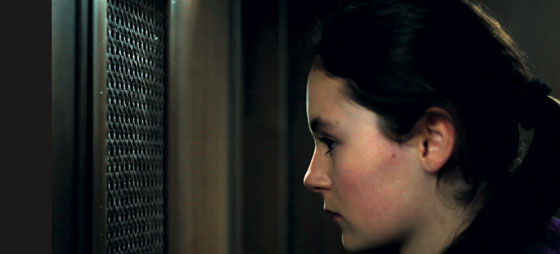Stations of the Cross: Maria's sacrifice
- Dietrich Brüggemann is competing in Berlin with a captivating and shocking film whose young heroine, raised in a traditionalist Catholic milieu, decides to sacrifice herself to God

Spectators at the Berlinale began their Sunday by attending a fascinating catechism class: that in the first tableau of Stations of the Cross [+see also:
trailer
Q&A: Dietrich Brüggemann
film profile] by German director Dietrich Brüggemann, a magnificently compelling film in the running for the Bears. In this first scene, Father Weber (whose serene brutality is very effectively rendered by Florian Stetter, the libertine Schiller in Dominik Graf's movie, also in competition), a member of the Brotherhood of Saint Pius X, prepares children to become soldiers of God after their Confirmation, with orders to flush out Satan in the smallest candy, pretty dress and, above all, music, generally considered as the Devil's handicraft. We also hear him answering his best pupil, Maria (Lea van Acken), on the possibility of sacrificing her life to save a sick child (we later learn that her youngest brother has still not begun to talk and that none of the doctors know why), and already, from this initial sequence, we are petrified by the film's power and range of understanding.
The impact of Stations of the Cross largely derives from the method employed by Brüggemann to revisit Christ's 14 stations of the cross, a method borrowed from his first feature film Nine Takes (widely appreciated in Berlin in 2006). The director has in fact opted to shoot each scene as a tableau, in a single sequence and as a static shot, enabling him to shed very clear light on each chapter in Maria's Passion, and above all to imbue the spiritual dialogues which succeed one another with gripping tension. This approach functions quite naturally as it is underpinned by the impeccable screenplay composed by the director and his sister and loyal co-screenwriter, actress Anna Brüggemann. As their family had brushed with Catholic "traditionalists" in the past, they were very familiar with the facts when they addressed today's very topical and important subject of a return to religion in its extremist forms.
In Maria's family, the dominant character is the bitingly strict mother (Franziska Weisz) – in the second tableau, she humiliates her daughter by accusing her of coquetry whereas the poor girl had only taken off the coat covering her blouse in a spirit of sacrifice, to expose herself to the cold. Like Father Weber, the mother inculcates in her children, and especially the eldest girl, precepts which turn the most harmless pleasure into a feeling of guilt. By this permanent assumption of sin, she taints Maria’s purity, increasingly and mercilessly making fun of the poor devout child, who simply aspires to follow the path of a saint and martyr, even if it means being insulted (more and more frequently) and real physical suffering.
The mother's absolute control, which extends even as far as her child's soul, is the despairing reflection of religious fundamentalism in general which makes us tremble with indignation. As pointed out by Anna Brüggemann, "any system that allows no other truth than its own (...) is always life-negating". Maria, who so admires the piety with a human face of her very gentle young au pair, is placed in an intolerable situation due to her mother's fanaticism. Her sacrifice is also a response to her feeling of being stifled, a way of escaping it, while following to the letter the only path she had ever been shown: it is the only way out, enabling her to preserve the love of the Almighty and that of her mother, and for the latter to feel comforted, even before her child's grave, in her narrowmindedness.
(Translated from French)
Did you enjoy reading this article? Please subscribe to our newsletter to receive more stories like this directly in your inbox.

























